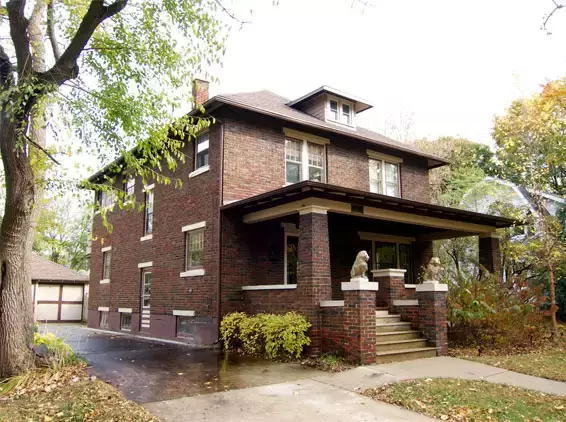Tips for First-Time Homebuyers

Purchasing your first home is an exciting milestone in life, but it can also feel overwhelming and daunting. As a first-time homebuyer, it's crucial to educate yourself on the homebuying process and be well-prepared before diving in. If you're considering taking the leap into homeownership, here are some tips to help guide you through the process.1. Establish a budget: Before you begin your home search, it's essential to determine how much you can afford. Consider your income, expenses, and future financial goals. This will allow you to set a realistic budget and avoid falling in love with a property that is beyond your means.2. Get pre-approved for a mortgage: Being pre-approved for a mortgage is a game-changer when it comes to house hunting. This will give you a clear idea of how much a lender is willing to lend you and allows you to act fast when you find a home you love. Additionally, it shows sellers that you are a serious buyer.3. Research neighborhoods: Take the time to research different neighborhoods that align with your lifestyle and priorities. Consider factors such as proximity to schools, amenities, commute times, and safety. Visiting neighborhoods at different times of the day can also give you a better sense of the area's atmosphere.4. Consider long-term plans: When buying your first home, it's important to think about your long-term plans. Are you planning to stay in the area for several years, or do you anticipate relocating in the near future? This will help determine the type of property you should invest in, whether it's a starter home or a property that suits your long-term needs.5. Work with a real estate agent: Partnering with a knowledgeable and experienced real estate agent can be invaluable as a first-time homebuyer. They can guide you through the process, help you navigate the market, negotiate on your behalf, and ensure you make an informed decision.6. Don't overlook additional costs: When budgeting for your first home, it's important to consider the additional costs beyond the purchase price. These can include closing costs, property taxes, homeowners insurance, and potential maintenance or renovation expenses. Factoring in these costs will help prevent financial surprises down the road.7. Attend open houses and inspections: Take advantage of open houses and inspections to get a better understanding of the homes you're interested in. Pay attention to the condition of the property, ask questions, and thoroughly inspect each room. This will give you a clearer idea of what you're looking for and help you make an informed decision.8. Don't rush the process: Buying a home is a significant investment, so it's important not to rush the process. Take your time, weigh the pros and cons of each property, and trust your instincts. Remember that finding the perfect home may take time, but it's worth being patient to find a property that meets your needs and dreams.By following these tips, first-time homebuyers can navigate the real estate market more confidently. Educating yourself on the process, setting a budget, and working with professionals will help ensure a smoother and more successful homebuying experience. So, take the leap and find your dream home!
Read MoreNegotiation Mistakes Home Buyers Should Avoid

When it comes to buying a home, negotiation is an essential part of the process. It can be a stressful and overwhelming experience, but avoiding certain mistakes can make a significant difference in the outcome. Here are some negotiation mistakes that home buyers should avoid.1. Not being pre-approved for a mortgageBefore beginning negotiations, it's important to have a clear understanding of your financial standing. Being pre-approved for a mortgage can give you an upper hand in negotiations. It shows the seller that you are a serious buyer and have the finances to back your offer. Without a pre-approval, the seller may take other offers more seriously, potentially losing you the home you want.2. Failing to research the local real estate marketKnowing the local real estate market can help you to make a reasonable offer on a home. If you make an offer that is too low, the seller may be insulted and less willing to negotiate. On the other hand, if you make an offer that is too high, you may end up overpaying for the property. Doing some research and knowing the market can help you to make an informed offer.3. Letting emotions guide negotiationsBuying a home can be an emotional experience, but letting emotions guide negotiations can lead to poor decision-making. Getting caught up in a bidding war or being too attached to a particular home can lead to overspending. It's important to keep a level head and make decisions based on logic and reason.4. Failing to include contingencies in the offerContingencies are conditions that must be met before a sale can be finalized. They protect the buyer in case something goes wrong during the buying process. Some common contingencies include home inspection, appraisal, and financing. Failing to include contingencies in the offer can leave you vulnerable and may make negotiations more difficult.5. Offering too low or negotiating too aggressivelyNegotiating too aggressively or offering a lowball offer can put the seller off and make negotiations more difficult. It's important to make a reasonable offer that takes into account the local market and the condition of the home. Being too aggressive can scare the seller away and leave you without a home.In conclusion, negotiation is an essential part of the home buying process. Avoiding these common mistakes can help you to negotiate effectively and get the home you want. Remember to be prepared, do your research, and keep a level head. With the right approach, you can negotiate a fair deal and start enjoying your new home.
Read MoreHow Much Housing Can You ACTUALLY Afford?

As a potential homebuyer, it's easy to get caught up in the excitement of house hunting and envisioning your dream home. However, before you start searching, it's important to determine how much housing you can actually afford. This will not only help you narrow down your options but also ensure that you don't end up in over your head financially.Buyers should start by taking a close look at their current financial situation. This includes factors like income, expenses, debt, and savings. When it comes to buying a home, lenders typically look for a debt-to-income ratio of 43% or lower. This means that your monthly debt payments (including your mortgage) should not exceed 43% of your gross monthly income.To get a better idea of what you can afford, it's also helpful to use an online mortgage calculator. This tool will take into account factors like your down payment, interest rate, and loan term to estimate your monthly payment. Keep in mind that the amount you can afford will also depend on the housing market in your area. In some parts of the country, housing prices may be significantly higher, making it more difficult to find affordable options.In addition to financial considerations, lifestyle factors can also impact how much housing you can afford. For example, if you have children, you may need to factor in the cost of living in a good school district. If you have a long commute to work, you may want to consider the cost of transportation or the potential savings of living closer to your job.Real estate news can also offer valuable insights into the affordability of housing in your area. For example, if there is a shortage of inventory or high demand for homes, prices may be higher. On the other hand, if the market is experiencing a downturn, you may be able to find better deals.Ultimately, it's important to remember that buying a home is a big decision and one that should not be taken lightly. While it may be tempting to stretch your budget to get the home of your dreams, this can lead to financial stress and even foreclosure if you're unable to keep up with payments. Instead, focus on finding a home that fits within your budget and meets your needs without putting you in financial jeopardy.In conclusion, determining how much housing you can actually afford requires a careful examination of your finances, lifestyle, and the housing market in your area. By taking the time to do this, you can find a home that is both affordable and meets your needs, allowing you to enjoy the benefits of homeownership without the stress of financial strain.
Read MoreiBuyer Cash Investors are Back To Ruin The Housing

The real estate market is constantly evolving, and the latest trend making waves in the industry is the return of iBuyer cash investors. These investors are back to shake things up and potentially ruin the housing market for both buyers and sellers. For those who are unfamiliar, iBuyer cash investors are companies that use technology and data analysis to make quick cash offers on homes. They then turn around and sell the homes for a profit. This may sound like a win-win situation, but it's not as simple as it seems. Let's start with the buyers. With iBuyer investors in the market, traditional buyers are facing increased competition and limited inventory. When iBuyer companies swoop in and make cash offers, they can often close on a home much faster than a traditional buyer who needs to secure financing. This can be discouraging for buyers who are already struggling to find a home within their budget. Sellers may also be in for a rude awakening. While iBuyer cash offers may seem tempting, they often come with hefty fees and costs. These companies make their profit by buying homes well below market value and then reselling them at a much higher price. This means that sellers who accept a cash offer from an iBuyer company may be leaving thousands of dollars on the table. What's more, iBuyer cash investors can also negatively impact the overall housing market. By buying homes below market value and then reselling them for a profit, they may artificially inflate home prices. This can make it even harder for traditional buyers to enter the market and afford a home. So, what can be done about the return of iBuyer cash investors? For buyers, it's important to work with a real estate agent who can help navigate the competitive market and find homes that meet their needs and budget. For sellers, it's crucial to carefully consider all offers and work with an agent who can help negotiate the best possible deal. It's also important for the real estate industry as a whole to continue to monitor the impact of iBuyer companies on the housing market. While innovation and technology can bring positive changes, it's important to ensure that these changes are not negatively impacting buyers and sellers. In conclusion, the return of iBuyer cash investors may seem like a convenient solution for those looking to buy or sell a home. However, it's important to carefully consider the potential drawbacks and work with professionals in the industry to make informed decisions. By doing so, we can ensure a healthy and fair housing market for all.
Read More-

As a first-time homebuyer, it can be overwhelming to navigate the real estate market. With so much information available, it's easy to fall into the trap of believing common home-buying myths. Here are four common home-buying myths debunked that can help you make an informed decision. Myth #1: You need a 20% down payment to buy a home. Many believe that you need a 20% down payment to qualify for a mortgage. While having a large down payment can help you secure a lower interest rate, it's not a requirement. Several loan programs allow for a lower down payment, such as FHA loans, which require as little as 1% down payment. Myth #2: You need a perfect credit score to buy a home. While having a good credit score is essential, it doesn't have to be perfect to qualify for a mortgage. Many lenders offer loans for individuals with credit scores as low as 580. However, keep in mind that a low credit score may result in a higher interest rate. Myth #3: You can't buy a home if you have student loan debt. Many believe that having student loan debt disqualifies them from buying a home. However, having student loan debt doesn't make you ineligible for a mortgage. Lenders will look at your debt-to-income ratio, which compares your monthly debt payments to your income. As long as you have a stable income and manageable debt, you can still qualify for a home loan. Myth #4: You don't need a real estate agent to buy a home. While it's possible to buy a home without a real estate agent, it's not recommended. A real estate agent can provide valuable insight into the local market, negotiate on your behalf, and guide you through the home-buying process. In conclusion, don't let common home-buying myths deter you from achieving your dream of homeownership. With the right information and guidance, you can make an informed decision and find the perfect home for you.
Read More Do these 4 things that most homebuyers forget

Buying a new home can be exciting, but it can also be overwhelming, especially if it's your first time. From finding the perfect property to securing a mortgage, there are many things to consider when buying a home. Unfortunately, in the midst of all the chaos, there are some critical things that most homebuyers forget. Here are four things that you don't want to overlook when you're in the market for a new home.1. Get a Pre-Approval LetterBefore you start house hunting, you should get pre-approved for a mortgage. It's easy to get caught up in the excitement of finding the perfect home, but you need to know your budget so you don't waste your time looking at houses that are outside of your price range. A pre-approval letter will give you a clear understanding of how much money you can borrow, so you can narrow down your search to homes that fit your budget. Plus, having a pre-approval letter will show sellers that you're a serious buyer.2. Think About Resale ValueWhen you're buying a home, it's important to think about the future. Even if you don't plan on moving anytime soon, you want to make sure that your home will be a good investment. That means you should consider the resale value of the property. Look for homes in desirable neighborhoods with good school districts and proximity to amenities like stores, restaurants, and parks. These factors will make your home more appealing to future buyers, which will increase its resale value.3. Consider the Maintenance CostsBuying a home is a significant financial investment, but the expenses don't end with the purchase price. You also need to think about the ongoing costs of maintaining your home. You'll need to budget for things like lawn care, repairs, and utilities. Make sure you factor these expenses into your monthly budget so you're not caught off guard when unexpected costs arise. If you're buying an older home, keep in mind that it may require more maintenance than a newer home.4. Don't Forget About Home InsuranceHome insurance is essential for protecting your investment. It can cover the cost of repairs or replacement if your home is damaged or destroyed by a fire, natural disaster, or other covered event. Don't wait until after you've closed on your home to start shopping for insurance. You should start researching insurance options as soon as you start your home search. This will give you time to compare policies and find the best coverage at the best price.In conclusion, buying a home can be a complicated process, but by keeping these four things in mind, you can make sure that you're making a sound investment. Remember to get pre-approved for a mortgage, think about resale value, consider the maintenance costs, and don't forget about home insurance. With these tips, you'll be well on your way to finding the perfect home for you and your family.
Read More3 Things To Ask Yourself Before You Buy A Home

Buying a home is a big decision that requires careful consideration. It's important to ask yourself a few questions before taking the plunge. Here are three things to ask yourself before you buy a home.1. What is my budget?One of the most important things to consider when buying a home is your budget. It's essential to have a clear understanding of your finances before you start looking at properties. This includes figuring out how much you can afford to spend on a down payment, as well as what your monthly mortgage payments will be.To determine your budget, start by taking a close look at your income and expenses. Consider your other financial obligations, such as car payments, student loans, and credit card debt. It's important to make sure that you can comfortably afford your mortgage payments without sacrificing other important financial goals.2. What are my must-haves?Another important consideration when buying a home is your list of must-haves. This can include anything from the number of bedrooms and bathrooms to the location of the property. It's important to have a clear idea of what you're looking for before you start your search.Make a list of your must-haves and prioritize them. This can help you narrow down your search and focus on properties that meet your needs. Keep in mind that you may need to compromise on some of your must-haves, especially if you're working within a tight budget.3. What is my long-term plan?Finally, it's important to consider your long-term plan when buying a home. Are you planning to stay in the same area for the foreseeable future, or are you open to moving elsewhere? Are you planning to start a family or have more children in the future?Thinking about your long-term plan can help you make a more informed decision about the type of property you should buy. For example, if you're planning to start a family, you may want to look for a home with plenty of bedrooms and outdoor space. If you're planning to move in a few years, you may want to focus on properties that are likely to appreciate in value.In conclusion, buying a home is a big decision that requires careful consideration. By asking yourself these three questions, you can make a more informed decision and find the right property for your needs and budget.
Read MoreHow much money do you need to buy a house?

Buying a house can be an exciting and rewarding experience, but it can also be a daunting task. One of the biggest questions on every potential homebuyer's mind is, "How much money do I need to buy a house?" The answer to that question is not straightforward, as there are many variables to consider. First and foremost, a homebuyer needs to determine how much they can afford to spend on a house. This requires a thorough assessment of their finances, including their income, expenses, debt, and credit score. Once they have a clear understanding of their financial situation, they can determine how much of a down payment they can afford to make. The down payment is the amount of money a homebuyer must pay upfront to secure a mortgage loan. The typical down payment is between 3% and 20% of the home's purchase price. The higher the down payment, the lower the mortgage loan amount and the lower the monthly mortgage payment. In addition to the down payment, there are other costs associated with buying a house. These include closing costs, which can range from 2% to 5% of the purchase price. Closing costs include fees for appraisals, inspections, title searches, and legal fees. Homebuyers should also factor in ongoing homeownership costs, such as property taxes, homeowners insurance, and maintenance and repairs. It's important to have a realistic understanding of these costs to ensure they can afford the ongoing expenses of homeownership. Research is key when determining how much money is needed to buy a house. There are many resources available to help homebuyers understand the costs associated with homeownership. One great resource is the National Association of Realtors' Home Affordability Calculator, which helps homebuyers determine how much house they can afford based on their income, expenses, and debt. In conclusion, the amount of money needed to buy a house depends on a variety of factors, including the home's purchase price, the down payment, closing costs, and ongoing homeownership expenses. Homebuyers should conduct thorough research and have a clear understanding of their financial situation before embarking on the homebuying process. With the right preparation and resources, homeownership can be a rewarding and affordable investment.
Read MoreHome buying mistakes you need to avoid.

Buying a home is a significant investment, and it requires careful planning and execution. However, many homebuyers make mistakes that cost them dearly. In this blog, we will look at some of the common home buying mistakes you need to avoid.1. Not Getting Pre-approved For A MortgageGetting pre-approved for a mortgage should be the first step when buying a home. A pre-approval will let you know how much you can afford and what your loan options are. It also gives you an advantage when you make an offer as it shows the seller that you are serious and capable of buying the house.2. Not Doing Enough ResearchBefore buying a home, you need to research the neighborhood, schools, and other amenities in the area. You should also compare prices and features of different homes to make an informed decision. Not doing enough research can lead to buying a home that does not meet your needs or paying too much for a property.3. Not Hiring A Real Estate AgentSome buyers think that they can save money by not hiring a real estate agent. However, a real estate agent can help you find the right property, negotiate the price, and handle the paperwork. They also have access to properties that are not listed on the market, giving you more options.4. Buying More House Than You Can AffordIt is easy to get carried away when buying a home, but you should not buy more house than you can afford. Your monthly mortgage payment should not be more than 28% of your gross monthly income. You should also consider other expenses such as property taxes, insurance, and maintenance costs.5. Not Getting A Home InspectionA home inspection is crucial before buying a property. It can uncover hidden issues such as structural problems, electrical issues, and plumbing problems. Not getting a home inspection can result in costly repairs down the line.In conclusion, buying a home is a significant decision, and you need to avoid common mistakes to make the process smoother. Getting pre-approved for a mortgage, doing enough research, hiring a real estate agent, buying a house you can afford, and getting a home inspection are critical steps to take when buying a property. By avoiding these mistakes, you can find your dream home without breaking the bank.
Read More
Recent Posts











